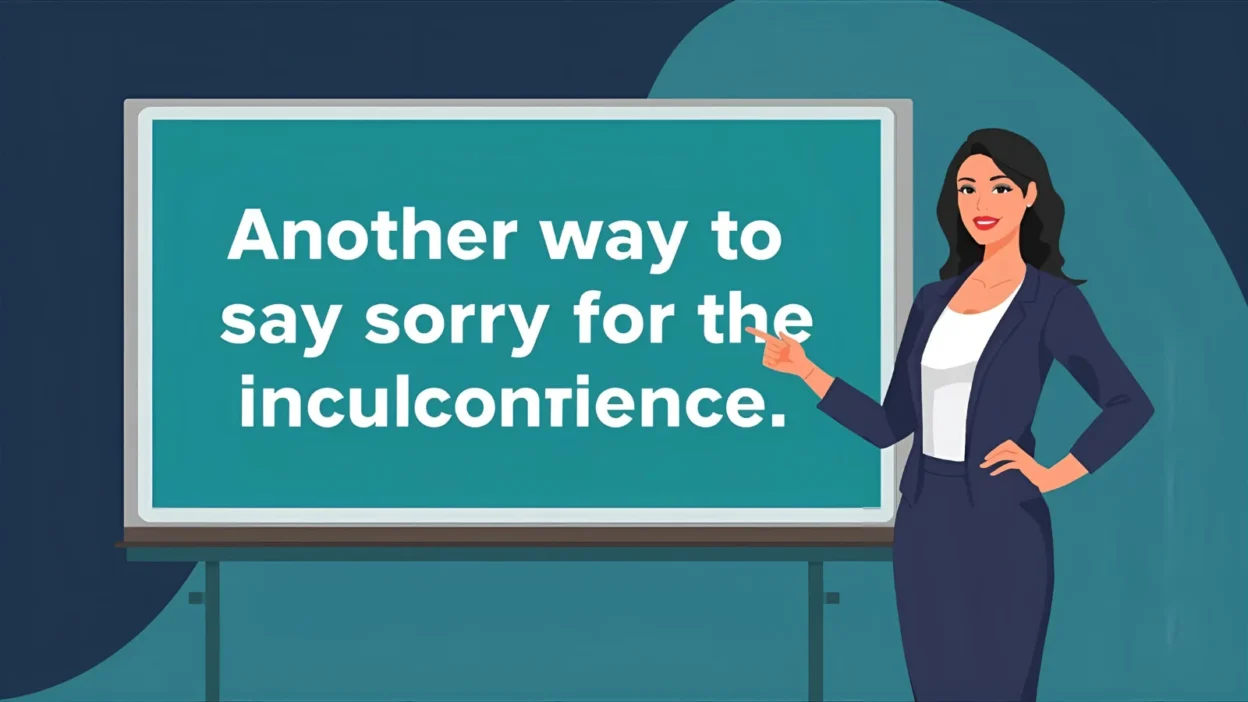The phrase “Sorry for the inconvenience” is polite and professional, but it’s also one of the most overused expressions in customer service, business communication, and emails. While it conveys empathy, using it too often or without variation can sound robotic or insincere.
To sound more genuine, empathetic, and professional, here are 25+ alternative ways to say “Sorry for the inconvenience,” each with its meaning, example, best use, and tone.
1. We Apologize for the Disruption
Meaning: Expresses regret for interrupting normal activity.
Example: We apologize for the disruption caused by the maintenance work.
Best Use: Professional, corporate communication.
Tone: Formal, sincere.
2. I’m Sorry for Any Trouble This May Have Caused
Meaning: Acknowledges potential impact in a kind, empathetic way.
Example: I’m sorry for any trouble this may have caused you.
Best Use: Emails or personal apologies.
Tone: Polite, compassionate.
3. Please Accept Our Apologies
Meaning: Formal expression of regret.
Example: Please accept our apologies for the delay in response.
Best Use: Business correspondence, customer service.
Tone: Formal, respectful.
4. We Regret the Inconvenience
Meaning: A professional and neutral way to apologize.
Example: We regret the inconvenience you experienced during checkout.
Best Use: Official statements or customer notifications.
Tone: Formal, corporate.
5. Thank You for Your Patience
Meaning: Focuses on appreciation instead of the problem.
Example: Thank you for your patience while we resolved the issue.
Best Use: Customer service and support emails.
Tone: Positive, appreciative.
6. I Appreciate Your Understanding
Meaning: A polite, forward-looking way to express gratitude and apology.
Example: I appreciate your understanding while we fix this.
Best Use: Professional and polite email communication.
Tone: Warm, respectful.
7. I Understand How Frustrating This Must Be
Meaning: Shows empathy and acknowledges the inconvenience directly.
Example: I understand how frustrating this must be, and I’m working to resolve it quickly.
Best Use: Customer service, personal replies.
Tone: Compassionate, human.
8. I’m Sorry for the Delay
Meaning: Specific and transparent apology.
Example: I’m sorry for the delay in getting back to you.
Best Use: Email responses, client communication.
Tone: Honest, courteous.
9. We’re Working Hard to Fix This
Meaning: Shifts focus to solution while acknowledging the issue.
Example: We’re aware of the issue and are working hard to fix it.
Best Use: Public statements, customer updates.
Tone: Reassuring, proactive.
10. I Regret Any Disruption This Has Caused
Meaning: Polite and formal expression of regret.
Example: I regret any disruption this has caused to your schedule.
Best Use: Formal reports or correspondence.
Tone: Professional, apologetic.
11. Sorry for the Trouble
Meaning: Friendly and simple expression of apology.
Example: Sorry for the trouble earlier today.
Best Use: Informal or conversational tone.
Tone: Casual, polite.
12. I Sincerely Apologize
Meaning: Strong and heartfelt expression of remorse.
Example: I sincerely apologize for the misunderstanding.
Best Use: When the issue caused personal or serious inconvenience.
Tone: Genuine, formal.
13. We’re Sorry for Any Confusion
Meaning: Acknowledges misunderstanding without assigning blame.
Example: We’re sorry for any confusion caused by the recent update.
Best Use: Customer service, policy clarifications.
Tone: Polite, neutral.
14. We Value Your Feedback
Meaning: Redirects focus to the customer’s experience positively.
Example: We value your feedback and will use it to improve our process.
Best Use: Customer communication after issues.
Tone: Professional, constructive.
15. I Know This Isn’t Ideal
Meaning: Expresses empathy and understanding.
Example: I know this isn’t ideal, and I truly appreciate your patience.
Best Use: Informal or customer-focused tone.
Tone: Relatable, kind.
16. I Appreciate Your Cooperation
Meaning: Expresses gratitude while maintaining professionalism.
Example: I appreciate your cooperation during this process.
Best Use: Business communication.
Tone: Professional, polite.
17. Thanks for Bearing with Us
Meaning: Casual, friendly way to acknowledge inconvenience.
Example: Thanks for bearing with us while we sort this out.
Best Use: Informal yet professional updates.
Tone: Friendly, conversational.
18. We’re Sorry for the Delay in Service
Meaning: Addresses a specific inconvenience clearly.
Example: We’re sorry for the delay in service this morning.
Best Use: Hospitality, logistics, or retail.
Tone: Professional, direct.
19. We Understand This Has Been Frustrating
Meaning: Empathetic acknowledgment of emotional impact.
Example: We understand this has been frustrating and are working to resolve it quickly.
Best Use: Customer experience management.
Tone: Compassionate, sincere.
20. Thank You for Bringing This to Our Attention
Meaning: Acknowledges feedback positively instead of focusing on the issue.
Example: Thank you for bringing this to our attention — we’ll make sure it’s corrected.
Best Use: Customer feedback or complaint handling.
Tone: Professional, appreciative.
21. Please Bear With Us
Meaning: Politely asks for patience during a delay or issue.
Example: Please bear with us while we finalize the update.
Best Use: Temporary service delays, technical updates.
Tone: Respectful, patient.
22. Our Apologies for the Delay
Meaning: Professional and concise expression of regret.
Example: Our apologies for the delay in delivery.
Best Use: Formal communication.
Tone: Polished, courteous.
23. Sorry for Any Inconvenience Caused
Meaning: A slightly varied and formal version of the original phrase.
Example: Sorry for any inconvenience caused during this process.
Best Use: Corporate or written communication.
Tone: Formal, neutral.
24. I’m Sorry This Happened
Meaning: Genuine and personal acknowledgment of an issue.
Example: I’m sorry this happened — let me make it right for you.
Best Use: Customer service, one-on-one communication.
Tone: Sincere, personal.
25. Thank You for Your Understanding and Support
Meaning: Combines gratitude with empathy and professionalism.
Example: Thank you for your understanding and support as we address this issue.
Best Use: Professional statements or business emails.
Tone: Warm, appreciative.
26. We’re Doing Our Best to Make It Right (Bonus)
Meaning: Shows responsibility and proactive attitude.
Example: We’re doing our best to make it right and prevent this from happening again.
Best Use: Customer recovery situations.
Tone: Reassuring, honest.
27. I Regret the Oversight (Bonus)
Meaning: Takes ownership of a mistake gracefully.
Example: I regret the oversight and will correct it immediately.
Best Use: Professional or formal apology.
Tone: Responsible, sincere.
Conclusion
While “Sorry for the inconvenience” is a polite standby, relying on it too much can make your apologies sound generic or insincere.
By using these 25+ thoughtful alternatives, you can communicate empathy, professionalism, and accountability in every situation — whether you’re emailing a client, addressing a customer, or responding to feedback.
A genuine apology goes beyond words — it’s about acknowledging the problem, taking responsibility, and showing care.



